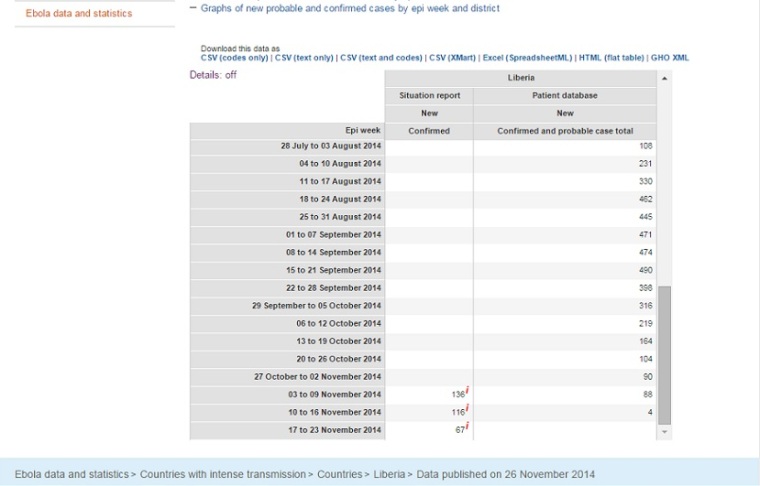Ebola cases: Liberia in decline, Guinea stable, Sierra Leone increasing

GENEVA (Christian Examiner) – The latest situation response map by the World Health Organization shows that Ebola virus "Case incidence is stable in Guinea, stable or declining in Liberia, but may still be increasing in Sierra Leone."
Now, officials fear that with gains that have been won over the last two months might be lost with complacency.
About 16,000 cases of Ebola have been reported in West Africa, dating to the death of a 2-year-old boy last December, though not seen as a crisis until mid-March, and not declared a "public health emergency of global concern" by the WHO until Aug. 7. More than 5,600 people have died, as of Nov. 24, the most recent figures verified by the World Health Organization.
Liberia, once considered the epicenter of the hot zone of Ebola infections, has reported a dramatic drop, reporting only four new cases in the patient database for the week of Nov. 10-16, from a high of 490 for the week of Sept. 15-21.
"However, the most optimistic forecasts don't have the epidemic under control until the middle of next year, and even that might not be possible without stepped-up efforts," wrote Maggie Fox in an online article for NBC News.
The three issues that could derail the progress already made: hand washing, person-to-person contact and burying practices. But for the moment, the World Health Organization says it's nearly on target with "ambitious" goals it set in October, related to isolating, treating and safely burying 70 percent of patients with Ebola in Liberia, Sierra Leone and Guinea, said Bruce Aylward M.D., assistant director general in charge of the Ebola response for the World Health Organization.
"We've reached an important milestone along the way, but that is not going to get you to zero," Aylward said. That being said, the "yawning gap" between disease levels and the capacity to cope have narrowed significantly, he added, but current achievements were "not good enough to stop Ebola."
Mark Doyle, an international development correspondent for BBC, provided an analysis of the current situation. "The United Nations' response mission and the World Health Organization base many of their stats on a hotchpotch of numbers from national health ministries, aid organizations and sketchy information their own officials can correlate," Doyle wrote.
"The truth is this crisis is taking place in one of the poorest corners of the world," he continued. "All three worst-affected countries [Liberia, Guinea, Sierra Leone] have bad roads, unreliable electricity supplies, severely under-resourced governments and poorly-educated populations. ... The number of dead is definitely an underestimate."
While the spread of Ebola has declined in parts of Liberia and the two major cities in Guinea, it is still spreading out of control in rural, hard-to-reach areas of western Sierra Leone, Aylward said at a news conference, adding, "There is no room for optimism as long as you are dealing with an Ebola virus."
Ebola could easily spread further across West Africa or anywhere in the world, as people travel from place to place, said Tony Banbury, head of the UN Ebola response mission in West Africa to the BBC. "That is why it's so important to get down to zero case as quickly as possible."
But after months of living in a siege environment, people who have avoided exposure for fear of contracting Ebola are beginning to slack off on safety measures that kept them free from the disease, such as frequent hand-washing and avoiding casual person-to-person contact.
The biggest difficulty, health workers have found, is related to time-honored funeral customs: washing, hugging and kissing the person who has died, in final gestures of love and respect. But the disease is at its most contagious stage just before death, and lingers afterwards in the deceased body, spreading to whomever touches it.
Regionally, aid efforts are having a positive effect, Aylward said. Ebola treatment units, safe burial teams and teams of experts tracing contacts with those who fall ill all are helping. "In the last 60 days across the three countries, there has basically been a doubling of Ebola beds," he said.
In Sierra Leone there now are 650 beds for Ebola patients, up from 267 in September, and treating people does make a difference, Aylward said. "Very definitely you can catch up with Ebola, even on this scale," the WHO physician said. "That is a very important message."
But in Liberia once-scarce hospital beds now are not being used, according to a Washington Post November report about the sharp decline in new cases. Some of the once busiest treatment facilities are now only half-full and officials are reassessing response actions, including how to proceed with 17 Ebola clinics with 100 beds each promised by the U.S. military but have not yet been built.
RELATED ARTICLE
Liberia prays, has plunge in Ebola cases not seen in other countries